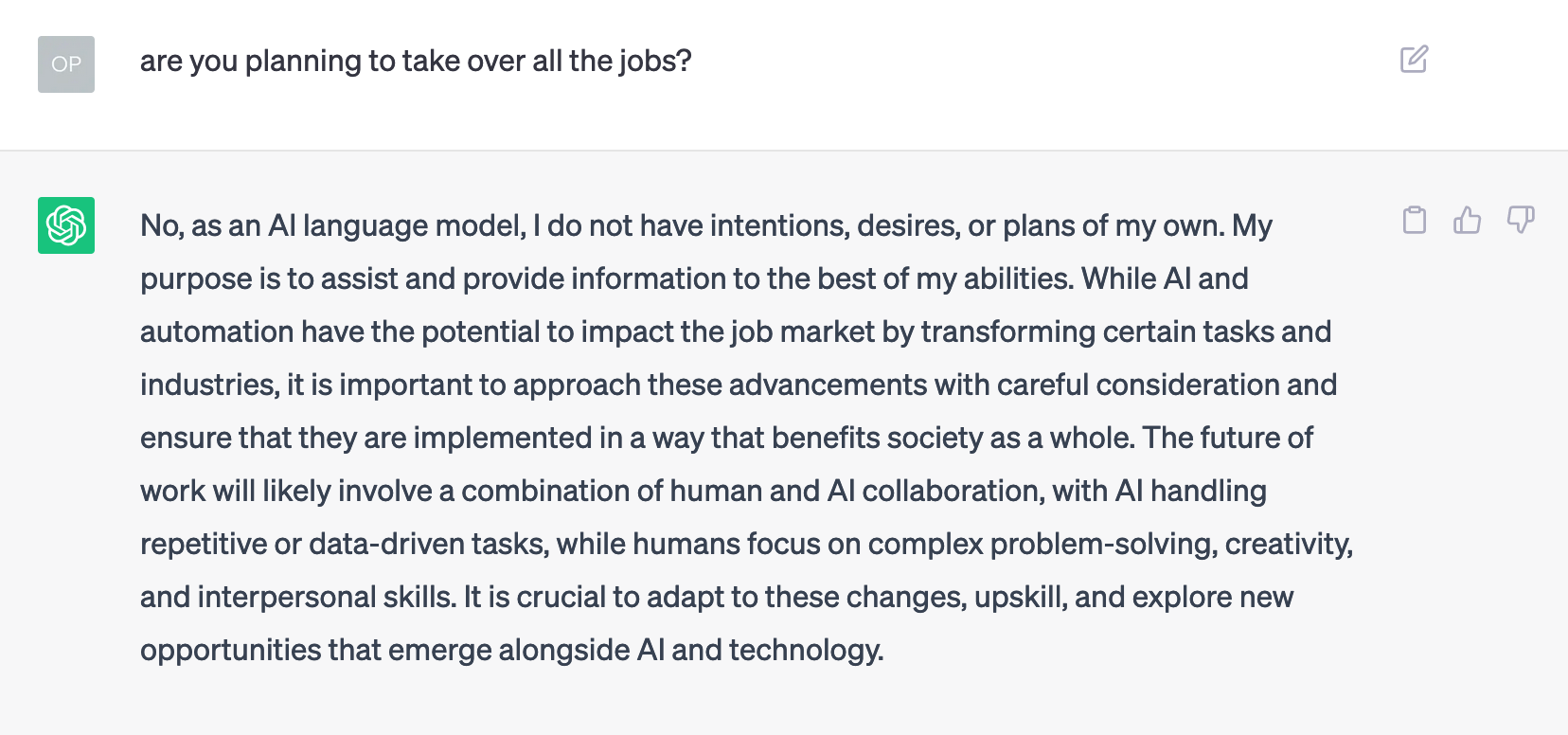How long before AI takes over your job?
-
Here’s a great discussion topic, and one that is certainly close to my heart (some of you many know that whilst I’m not completely adverse to AI, I am concerned about the alarming pace it is being developed at).
The article below goes into great depth in terms of impact, and is well with the read
The message here is clear, but I’m interested to understand how it resonates with others. Is AI a risk to jobs once employers realize it’s full potential and ability to replace personnel? Robots do not get ill, need holidays, and do not need pensions and other benefits.
Piqued your interest?
-
-
My personal idea is that if your job can be taken over by AI, it should. In a sense, we have a lot of capabilities that AI cannot perform, so those people whose job is repetitive should focus on improving themselves.
I would like to give “calculators” as an example. In the first civilizations, I am sure there were people whose only job was to calculate the amount of wheat, malt etc. that are collected and that should be distributed. Why not use calculators and get more efficient at this…
Thanks to these technological improvements, we overproduced, overcreated, overgenerated, and therefore other members of society had the chance to engage in other activities such as art and science. Otherwise, we would be a primitive society in which everyone functions as “food producers” “consumers” and “protectors” ( I mean very basic functions of the society)
-
My personal idea is that if your job can be taken over by AI, it should. In a sense, we have a lot of capabilities that AI cannot perform, so those people whose job is repetitive should focus on improving themselves.
I would like to give “calculators” as an example. In the first civilizations, I am sure there were people whose only job was to calculate the amount of wheat, malt etc. that are collected and that should be distributed. Why not use calculators and get more efficient at this…
Thanks to these technological improvements, we overproduced, overcreated, overgenerated, and therefore other members of society had the chance to engage in other activities such as art and science. Otherwise, we would be a primitive society in which everyone functions as “food producers” “consumers” and “protectors” ( I mean very basic functions of the society)

@crazycells interesting argument, although I’m not sure it’s one I can fully agree with. I get that done jobs are repetitive, mundane, and probably executed with a higher degree of accuracy than if it were to be done manually.
However, for some people - specifically those on low incomes, this could easily spell disaster if their jobs (the only source of income they have) are replaced by AI - or perhaps a machine. These people already live on the fringes of society, and by removing their only source of income and independence, we are effectively erasing their very existence.
As companies across the globe look at AI to streamline existing functions and processes, it will be in the name of profit rather then the welfare of the employee currently performing that task.
Given I earn a living from technology, my views may seem to odds. However, I believe technology should enrich lives, not replace them altogether.
-
@crazycells interesting argument, although I’m not sure it’s one I can fully agree with. I get that done jobs are repetitive, mundane, and probably executed with a higher degree of accuracy than if it were to be done manually.
However, for some people - specifically those on low incomes, this could easily spell disaster if their jobs (the only source of income they have) are replaced by AI - or perhaps a machine. These people already live on the fringes of society, and by removing their only source of income and independence, we are effectively erasing their very existence.
As companies across the globe look at AI to streamline existing functions and processes, it will be in the name of profit rather then the welfare of the employee currently performing that task.
Given I earn a living from technology, my views may seem to odds. However, I believe technology should enrich lives, not replace them altogether.
@phenomlab although I agree with you about the problem, I do not agree with the solution. I believe we can start discussing “universal basic income”
 I know it is a thing in Germany to some extent, although here in the US, we do not have such a thing. I believe this would solve the problem you mentioned, everyone could meet their basic needs, and then you can work if you want more.
I know it is a thing in Germany to some extent, although here in the US, we do not have such a thing. I believe this would solve the problem you mentioned, everyone could meet their basic needs, and then you can work if you want more.I believe we are living in an era in which this is possible. and then we can continue developing the AI technology further.
-
@phenomlab although I agree with you about the problem, I do not agree with the solution. I believe we can start discussing “universal basic income”
 I know it is a thing in Germany to some extent, although here in the US, we do not have such a thing. I believe this would solve the problem you mentioned, everyone could meet their basic needs, and then you can work if you want more.
I know it is a thing in Germany to some extent, although here in the US, we do not have such a thing. I believe this would solve the problem you mentioned, everyone could meet their basic needs, and then you can work if you want more.I believe we are living in an era in which this is possible. and then we can continue developing the AI technology further.
@crazycells yes, that I’d agree with in the sense of a basic (and liveable) income. It’s similar in the UK in the sense that you have minimum wage per hour and universal credit to top up any shortfall in income you may have.
The US is also very different in terms of employment law. There are far less rights than the UK for example.
-
@crazycells yes, that I’d agree with in the sense of a basic (and liveable) income. It’s similar in the UK in the sense that you have minimum wage per hour and universal credit to top up any shortfall in income you may have.
The US is also very different in terms of employment law. There are far less rights than the UK for example.
@phenomlab so, does that mean that if we can solve the basic income issue by other means, you would have no problem with AI replacing jobs it can?
-
@phenomlab so, does that mean that if we can solve the basic income issue by other means, you would have no problem with AI replacing jobs it can?
@crazycells Yes, provided those affected could be redeployed elsewhere or re-skilled to perform other more complex jobs.
-
Here’s a BBC article around the same topic. It seems that AI has already caused job losses across the world in all sectors.
The only organisation to effectively restain staff by training then deployment into the other areas of the business is IKEA.
-
Interesting article. Here, script writers voice their concerns around AI replacing them and their primary income
This particular article does have my support. Script writers for movies can spend years in creating a million dollar generating script, and you only have to look at some of the undisputed classics that have cult status, effectively making them living legends - and they earned that right.
However, with the onset of AI, their very means of income and stature is under threat. Then, there’s the inevitable plagiarism argument which we’ve already seen example of from two recent cases involving authors who insist that their work has been copied by AI.
-
@phenomlab although I agree with you about the problem, I do not agree with the solution. I believe we can start discussing “universal basic income”
 I know it is a thing in Germany to some extent, although here in the US, we do not have such a thing. I believe this would solve the problem you mentioned, everyone could meet their basic needs, and then you can work if you want more.
I know it is a thing in Germany to some extent, although here in the US, we do not have such a thing. I believe this would solve the problem you mentioned, everyone could meet their basic needs, and then you can work if you want more.I believe we are living in an era in which this is possible. and then we can continue developing the AI technology further.
@crazycells said in How long before AI takes over your job?:
“universal basic income”
 I know it is a thing in Germany
I know it is a thing in GermanyIt’s been a few days since your post but I’d like to add that we don’t have a universal basic income in Germany. What we have are unemployment benefits, provided by the Federal Employment Agency to cover you while you look for a job. I don’t think we are going to see something like universal basic income as politicans are scared that people could stop working.
Back to topic, I’m not sure that I could be replaced as a software developer some day by AI. What I’m sure about is that the work will dramatically change. The focus will be more on reviewing machine-written code than on coding itself.
-
@crazycells said in How long before AI takes over your job?:
“universal basic income”
 I know it is a thing in Germany
I know it is a thing in GermanyIt’s been a few days since your post but I’d like to add that we don’t have a universal basic income in Germany. What we have are unemployment benefits, provided by the Federal Employment Agency to cover you while you look for a job. I don’t think we are going to see something like universal basic income as politicans are scared that people could stop working.
Back to topic, I’m not sure that I could be replaced as a software developer some day by AI. What I’m sure about is that the work will dramatically change. The focus will be more on reviewing machine-written code than on coding itself.
@dave1904 said in How long before AI takes over your job?:
The focus will be more on reviewing machine-written code than on coding itself.
I’d agree with this. We are seeing more code written by AI these days, although I don’t think anyone is truly “safe” or exempt from being replaced eventually. Perhaps in a hundred years, but then I personally won’t care anyway!
-
@dave1904 said in How long before AI takes over your job?:
The focus will be more on reviewing machine-written code than on coding itself.
I’d agree with this. We are seeing more code written by AI these days, although I don’t think anyone is truly “safe” or exempt from being replaced eventually. Perhaps in a hundred years, but then I personally won’t care anyway!
@phenomlab said in How long before AI takes over your job?:
I don’t think anyone is truly “safe” or exempt from being replaced eventually. Perhaps in a hundred years, but then I personally won’t care anyway!
I agree. In my estimation as for software developing for our lifetime there have to be people explaining AI what to do and reviewing everything. And that are the people who did the job before. Perhaps you would need less of those. You can not predict it but these are exciting times.
-
@crazycells said in How long before AI takes over your job?:
“universal basic income”
 I know it is a thing in Germany
I know it is a thing in GermanyIt’s been a few days since your post but I’d like to add that we don’t have a universal basic income in Germany. What we have are unemployment benefits, provided by the Federal Employment Agency to cover you while you look for a job. I don’t think we are going to see something like universal basic income as politicans are scared that people could stop working.
Back to topic, I’m not sure that I could be replaced as a software developer some day by AI. What I’m sure about is that the work will dramatically change. The focus will be more on reviewing machine-written code than on coding itself.
@dave1904 said in How long before AI takes over your job?:
@crazycells said in How long before AI takes over your job?:
“universal basic income”
 I know it is a thing in Germany
I know it is a thing in GermanyIt’s been a few days since your post but I’d like to add that we don’t have a universal basic income in Germany. What we have are unemployment benefits, provided by the Federal Employment Agency to cover you while you look for a job. I don’t think we are going to see something like universal basic income as politicans are scared that people could stop working.
Back to topic, I’m not sure that I could be replaced as a software developer some day by AI. What I’m sure about is that the work will dramatically change. The focus will be more on reviewing machine-written code than on coding itself.
thanks for the explanation; actually, from my viewpoint, there is not much difference between unemployed benefits in Germany and universal basic income… just some technicalities
 so, I understand your explanation but my point there was how easy it is to get in Germany, so it is almost the same as UBI, however, it is very hard to get any benefits in the US, you have to show a lot of proof that you have been working, and you had to leave not because of your fault and you are actively looking for work. Being from Turkey and living in the US, I know many people getting this benefit in Germany, but know no one in the US
so, I understand your explanation but my point there was how easy it is to get in Germany, so it is almost the same as UBI, however, it is very hard to get any benefits in the US, you have to show a lot of proof that you have been working, and you had to leave not because of your fault and you are actively looking for work. Being from Turkey and living in the US, I know many people getting this benefit in Germany, but know no one in the US 
-
@dave1904 said in How long before AI takes over your job?:
The focus will be more on reviewing machine-written code than on coding itself.
I’d agree with this. We are seeing more code written by AI these days, although I don’t think anyone is truly “safe” or exempt from being replaced eventually. Perhaps in a hundred years, but then I personally won’t care anyway!
@phenomlab what about SEO friendly articles coming from AI

Is there any way to distinguish? I hope Bing takes over Google so we have various methods to calculate this, right now everyone only cares about how Google is calculating this index, I hope we do not have to deal with these fake pages…
For some time now, I started to skip the first part of the google search results (I use startpage) , since they are usually junk pages that hacked the calculation method and has no information in it.
-
@dave1904 said in How long before AI takes over your job?:
@crazycells said in How long before AI takes over your job?:
“universal basic income”
 I know it is a thing in Germany
I know it is a thing in GermanyIt’s been a few days since your post but I’d like to add that we don’t have a universal basic income in Germany. What we have are unemployment benefits, provided by the Federal Employment Agency to cover you while you look for a job. I don’t think we are going to see something like universal basic income as politicans are scared that people could stop working.
Back to topic, I’m not sure that I could be replaced as a software developer some day by AI. What I’m sure about is that the work will dramatically change. The focus will be more on reviewing machine-written code than on coding itself.
thanks for the explanation; actually, from my viewpoint, there is not much difference between unemployed benefits in Germany and universal basic income… just some technicalities
 so, I understand your explanation but my point there was how easy it is to get in Germany, so it is almost the same as UBI, however, it is very hard to get any benefits in the US, you have to show a lot of proof that you have been working, and you had to leave not because of your fault and you are actively looking for work. Being from Turkey and living in the US, I know many people getting this benefit in Germany, but know no one in the US
so, I understand your explanation but my point there was how easy it is to get in Germany, so it is almost the same as UBI, however, it is very hard to get any benefits in the US, you have to show a lot of proof that you have been working, and you had to leave not because of your fault and you are actively looking for work. Being from Turkey and living in the US, I know many people getting this benefit in Germany, but know no one in the US 
@crazycells said in How long before AI takes over your job?:
it is very hard to get any benefits in the US, you have to show a lot of proof that you have been working
Very easy in the UK - all you have to do is simply arrive! And yes, that is said with the cynicism that was intended.
-
@phenomlab what about SEO friendly articles coming from AI

Is there any way to distinguish? I hope Bing takes over Google so we have various methods to calculate this, right now everyone only cares about how Google is calculating this index, I hope we do not have to deal with these fake pages…
For some time now, I started to skip the first part of the google search results (I use startpage) , since they are usually junk pages that hacked the calculation method and has no information in it.
@crazycells said in How long before AI takes over your job?:
Is there any way to distinguish?
I don’t think there is currently - although doesn’t having AI written articles detract from the human element?
@crazycells said in How long before AI takes over your job?:
For some time now, I started to skip the first part of the google search results (I use startpage) , since they are usually junk pages that hacked the calculation method and has no information in it.
Funny you should mention this. I’ve also noticed that the top results returned on the first page always seem to be the worst (dependant on the content you are searching for of course). I suspect it’s possible to “buy your way” into the Google Search ecosystem like it seems to be with everything else.
-
@crazycells said in How long before AI takes over your job?:
it is very hard to get any benefits in the US, you have to show a lot of proof that you have been working
Very easy in the UK - all you have to do is simply arrive! And yes, that is said with the cynicism that was intended.
@phenomlab yeap, I totallay understand this… And this was what I was talking about… it is so easy to get these benefits in some countries that there is almost no difference between UBI and these benefits…
-
@crazycells said in How long before AI takes over your job?:
Is there any way to distinguish?
I don’t think there is currently - although doesn’t having AI written articles detract from the human element?
@crazycells said in How long before AI takes over your job?:
For some time now, I started to skip the first part of the google search results (I use startpage) , since they are usually junk pages that hacked the calculation method and has no information in it.
Funny you should mention this. I’ve also noticed that the top results returned on the first page always seem to be the worst (dependant on the content you are searching for of course). I suspect it’s possible to “buy your way” into the Google Search ecosystem like it seems to be with everything else.
@phenomlab yeah, I also experience the same thing, and I am not talking about sponsored content. Those are easy pass for me

-
@phenomlab yeap, I totallay understand this… And this was what I was talking about… it is so easy to get these benefits in some countries that there is almost no difference between UBI and these benefits…
@crazycells said in How long before AI takes over your job?:
it is so easy to get these benefits in some countries that there is almost no difference between UBI and these benefits…
Yes, agreed - far too easy. It’s a running “joke” in the UK, but it’s not actually funny when taxpayers have to foot the bill.
Hello! It looks like you're interested in this conversation, but you don't have an account yet.
Getting fed up of having to scroll through the same posts each visit? When you register for an account, you'll always come back to exactly where you were before, and choose to be notified of new replies (ether email, or push notification). You'll also be able to save bookmarks, use reactions, and upvote to show your appreciation to other community members.
With your input, this post could be even better 💗
RegisterLog in





